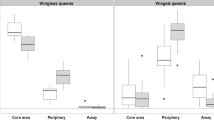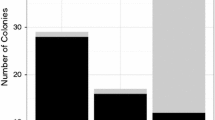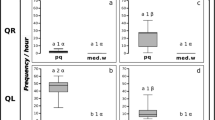Abstract
In several species of ants, queens often form temporary cooperative associations during colony foundation. These associations end soon after the eclosion of the first workers with the death or expulsion of all but one of the queens. This study examined competition between foundress queens of the fire ant Solenopsis invicta. Although attacks by the workers contributed to queen mortality, queens gained no advantage by producing more workers than their co-foundresses. Restriction fragment length polymorphism analysis of mitochondrial DNA showed that the queen producing more workers during colony founding was no more likely to survive than the less productive queen. In experimentally manipulated colonies in which all the workers were daughters of only one of the queens, the mother of the workers was no more likely to survive than the unrelated queen. Queens producing diploid males reared fewer offspring but were as likely to survive as queens producing only workers. These results suggest that workers do not discriminate between related and unrelated queens within colonies. Aggressive encounters between queens were common. Queens were more likely to die or be expelled if paired with heavier queens or if they lost more weight than their co-foundress during the claustral period. Finally, when queens were separated by screens through which workers could pass, the workers usually attacked and killed the queen farther from the brood. These results suggest that queen survival is promoted by a high fighting ability relative to co-foundresses, rather than by increased worker production, and that workers respond to queen differences that are independent of kinship.
Similar content being viewed by others
Author information
Authors and Affiliations
Additional information
Received: 8 September 1995/Accepted after revision: 5 March 1996
Rights and permissions
About this article
Cite this article
Balas, M., Adams, E. The dissolution of cooperative groups: mechanisms of queen mortality in incipient fire ant colonies. Behav Ecol Sociobiol 38, 391–399 (1996). https://doi.org/10.1007/s002650050256
Issue Date:
DOI: https://doi.org/10.1007/s002650050256




